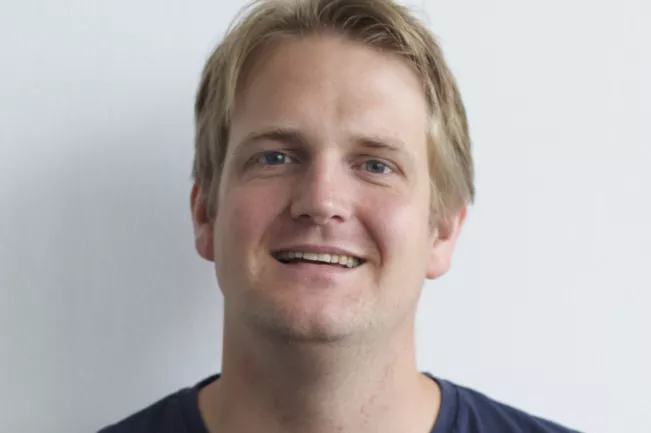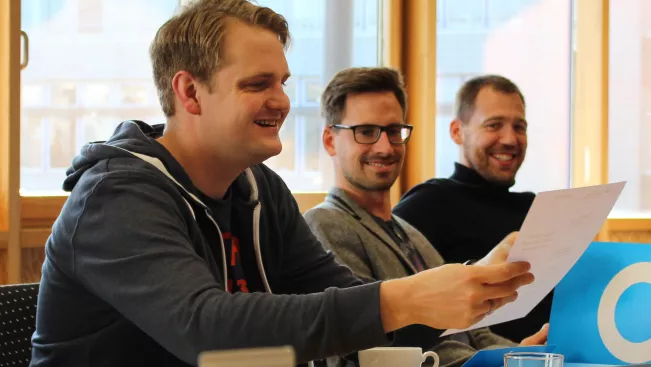Communications and Marketing | Alumni Office

Oliver Zilken, Computer Science

Outsiders usually don't understand much about computer science: lots of incomprehensible code that miraculously comes together to form functioning software. Hardly anyone realises the complex processes behind such, ideally very simple, software. You might imagine a dark room in which computer nerds sit in front of their screens and incessantly type in numbers and letters.
But when you enter the Rewe Digital site in Cologne, where Oliver Zilken works, it looks completely different: A wide, open space, plants everywhere, the white walls are covered with small greetings and complicated tables. On the way to his workstation, the 1.91 metre tall Zilken is greeted by many and asked how he is doing. With his relaxed manner in a white shirt, jeans and slightly tousled blond hair, he shakes a lot of hands. Just like among friends. At Zilken's workplace there is a note that reads: "The best Olli."
Only small details indicate that software is developed here. Several crates of particularly caffeinated Club Mate iced teas, for example, and large Android and Apple icons on the walls. "We are currently developing the shopping app for Rewe, one version for Apple and one for Android." Rewe Digital is a subsidiary of the Rewe Group that develops all the necessary software for the retail giant. The employees use the so-called Scrum approach. This means that they work exclusively in teams and each team has a number of tasks that it can work on. The essence of Scrum is that many requirements and solution approaches are not clearly defined at the start of the project, but are developed by the individual teams in their areas based on their direct experience. In the software sector in particular, this often leads to better results in the end, but this project management method is now also used in many other sectors of the economy. On average, there are eight to ten employees in a team at Rewe Digital and they all sit at the same table. "Direct communication and openness are very important in order to make good progress as a team," says Zilken.
A good end product requires different parties in software production: one that thinks about profit, i.e. wants to see successful software. One that is responsible for the visual appearance, so that the software also appeals to the customer on the outside. And there are the IT people who take care of the background: What happens when I click here, what happens there. In the outdated software development process, these teams were separate and communication essentially only took place via the project manager. He could make decisions on his own, but also had to take responsibility.
Scrum works differently: someone from each party is represented in a team. There are the specialists, the developers and the designers. One person, known as the product owner, is responsible for communication between the team and those responsible for setting the requirements. The last member of the team is the Scrum Master, the role played by Oliver Zilken. He takes care of the atmosphere between the people and moderates the meetings. It's very much about the personal, the human element. "From time to time, you're the doormat for the others, but it's still a lot of fun. I don't take it personally, it's my job."
The team selects a task together and works on it together. As every piece of software, in this case every app, consists of many small building blocks, each small building block is also worked on individually. One building block for the Rewe online app, for example, is logging into the account. The team is now developing everything for this: the look, the functions, the codes. This part is then presented to testers who evaluate it. The module is returned to the team with any points of criticism. This results in much more intensive communication between developers and testers - and not just when the app is finished. "This way of working isn't any faster," explains Zilken, "but ultimately it's more effective because we know directly what people want."

Zilken's degree programme didn't actually have much to do with communication. He studied computer science at H-BRS until 2007 and also completed his Master's degree after completing his Bachelor's degree. "I thought the degree programme was pretty good, it was very mixed, from computer science to business studies, and we had a lot of contact with the professors. Nevertheless, I would say that pure computer science is rather boring." When he initially worked as a software developer in a few companies after graduating, this role did not completely fulfil him. "Even back then during my studies, I almost enjoyed working in the student council and the senate more. I made a lot of friends there that have lasted to this day."
Zilken likes things to be human; communication and interaction are important to him. And in this respect, his future path was perhaps pre-programmed. Especially as he was born and raised in Cologne and is a typical Rhineland cheerful person who simply likes to be surrounded by like-minded people. Even at work: "I worked as a traditional developer for four years and didn't like the hierarchies right from the start. In the traditional structures, things were too cumbersome, too slow and ultimately the product that the customer wanted to see didn't come out." When his former company iDev switched to Scrum, Oliver Zilken was immediately on board. Two years earlier, in 2009, he had already started to take an interest in Scrum and gather information about it. As Scrum Master is not a profession that requires training, anyone who wants to fulfil this position has to gather information from their own networks. The 34-year-old Zilken has been working at Rewe Digital since 2014 and is very happy there.
But someone whose job specialises in constantly making contacts and improving communication between others also needs some peace and quiet. "In the evening, I put my mobile phone and all the computer stuff away," says Zilken. "I have a wife and two children, as well as six chickens and a whole fish farm in the basement." He runs the latter as a hobby together with his wife: they breed fighting fish. "Totally off the beaten track, but this is my time out at home, and I want to have something to touch, to be hands-on." Zilken is responsible for the technology of the aquariums, while his wife, a trained chemical laboratory technician, is in charge of the animals' complicated genetics.
While he grins and scrolls through photos of his fighting fish on his mobile phone, Zilken is tapped. "Have you got any paper clips?" Somewhat confused, he searches through his drawers and unfortunately has to say no. He looks at his watch and explains that he has to go to his next meeting straight away. As he leaves, he shouts a cheerful "Bye!"
The visit to Oliver Zilken shows: Computer science doesn't just have to consist of dry numbers. Behind every piece of software are a lot of interesting people who have helped to simplify our digital lives. People like Oliver Zilken.
Text: Antonia Heizmann.
Antonia Heizmann is studying technical journalism at our university. She wrote this portrait as part of an elective course (portrait writing using the example of H-BRS alumni) in the winter semester 2015/2016.